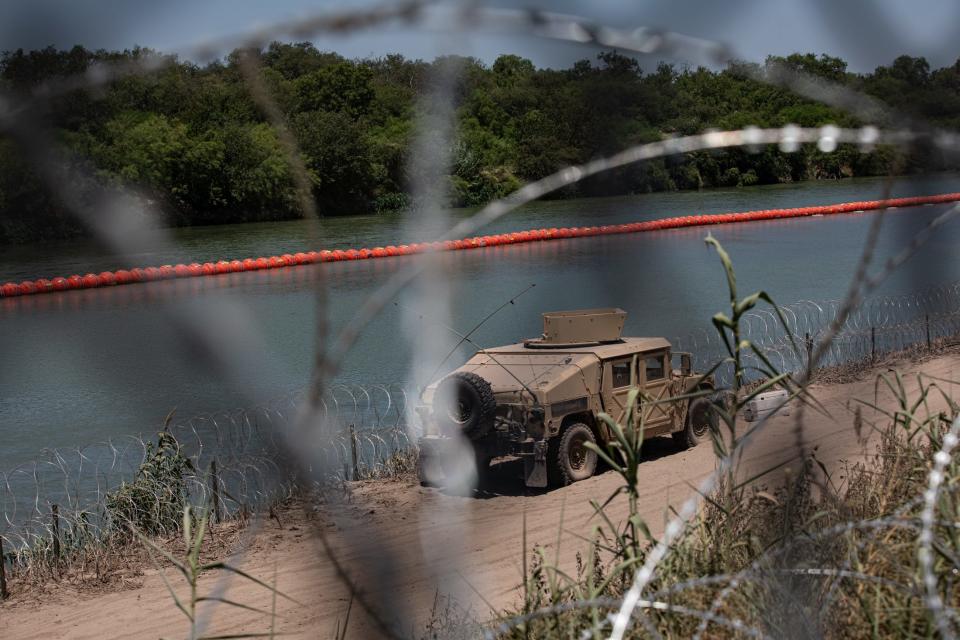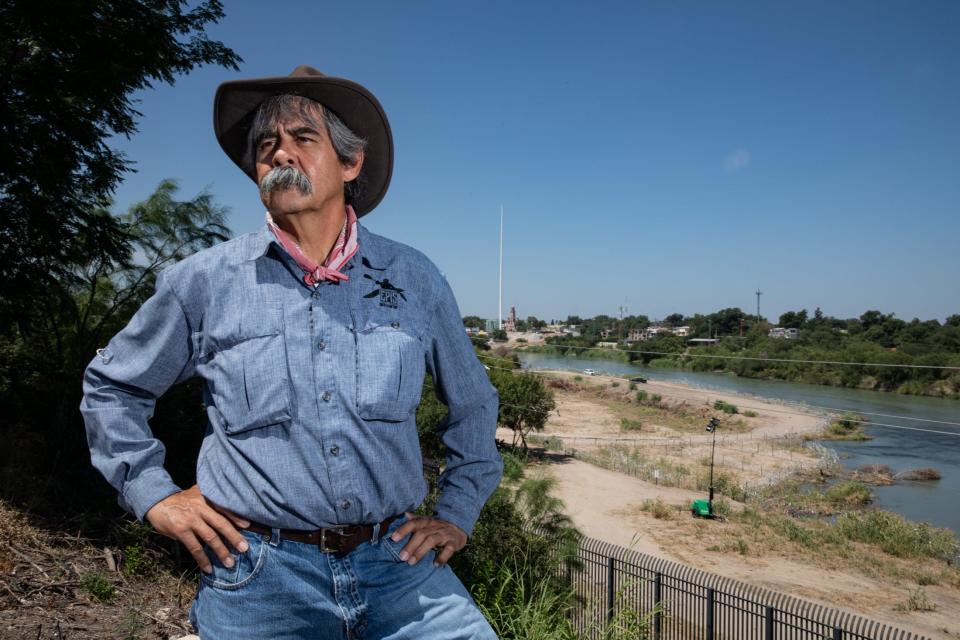How the buoys and other parts of Operation Lone Star affect life in Eagle Pass
- Oops!Something went wrong.Please try again later.
EAGLE PASS — At 62, retired teacher Jessie Fuentes was hoping to supplement his pension by running a small kayaking tour company on the river where his dad taught him to swim and where he and his buddies growing up used to have mud ball fights.
And for more than four years, the retirement dream was coming true. That is, until the Rio Grande in Eagle Pass was transformed into a militarized zone as part of Gov. Greg Abbott's border enforcement policy.
Now Fuentes is suing the governor, saying his newly installed floating barrier system has killed his business and is destroying the natural beauty, and natural flow of the river that separates Texas from Mexico.
"They took away something that doesn't belong to them," Fuentes said in an interview as he watched from a bluff the buildup of military vehicles, layers of razor wire and buoys that now makes his stretch of the Rio Grande inaccessible to people like him whose lives and the river have long been intertwined.
Fuentes, whose company is Epi’s Canoe and Kayak, said he was not a particularly active Democrat until the presence of National Guard soldiers from Texas and elsewhere and the influx of troopers from the Texas Department of Public Safety became all but unavoidable in Eagle Pass and numerous other communities up and down the Rio Grande.

The buildup is part of Abbott's multibillion-dollar Operation Lone Star that the Republican governor says is needed because the federal response to illegal immigration has been woefully inadequate under Democratic President Joe Biden.
The installation of the buoys, a 1,000-foot string of giant red balls that on Thursday afternoon floated lazily in the middle of Rio Grande a couple miles east of downtown Eagle Pass, prompted Fuentes to file his lawsuit against Abbott in Travis County.
Abbott announced his plan in June to install the buoys manufactured by Cochrane Global, which bills itself as being among "world leaders in fixed and mobile perimeter barrier solutions." The devices are designed to spin in the water to prevent migrants from climbing aboard them and netting below the surface makes swimming under the barrier virtually impossible.
Installation began in early July and the price tag is $1 million. The 1,000-foot string can be moved from place to place along the river.
Abbott has insisted that their installation in the river, overseen by International Boundary and Water Commission, is within his authority because of what he says is a state emergency caused by migrants crossing unlawfully into Texas.
"What we're doing right now is we're securing the border at the border," he said when the buoy project was announced. "What the buoys will allow us to do is to prevent people from even getting to the border."
And after the suit was filed, the governor gave no indication it would affect his policies, but he did say his office would vigorously contest it.
"We will see you in court," Abbott said in a tweet that was retweeted more than 1,200 times responding to the lawsuit. "And don't think the Travis (County) Court will be the end of it. This is going to the Supreme Court. Texas has a constitutional right to secure our border."

Fuentes' lawsuit disputes that contention.
“A plain reading of the (Abbott's disaster declaration) reveals as a matter of law that this statute cannot be used to regulate the Texas-Mexico border because none of its definitions address immigrants, the border, or crimes committed by immigrants,” the suit reads.
Fuentes, an audio-visual teacher before his retirement in 2020, said the buoys − and the decision to raze the plant life and destroy bird habitats on a tiny island near what used to be the boat launch on a public park that is now off limits to civilians − also factored his decision to sue.
"Everything they are doing, excuse me, f---s up the ecosystem," he said.
The buoys are on a stretch of the river that runs along the edge of Heavenly Farms, a manicured grove of pecan trees that Hugo and Magali Urbina purchased a few years ago as a business venture.
Magali Urbina supports efforts to secure the border, but she said the byproducts of Operation Lone Star are harming the couple's ability grow and sell healthy pecans. And she's even further distressed by reports of migrants drowning or being lacerated by the entanglement of razor wire along the river banks, and along nearby fencing.
"All of this law enforcement and soldiers and vehicles driving (on farm property) is kicking up dust that interferes with the pollination of our pecan trees," she said in an interview.
"We need to control immigration," she added, "but it should be done in a decent and humane way."

She and her husband have asked that the cyclone fencing, laced at the base with razor wire that recently trapped a pregnant migrant and topped by barbed wire that was installed by the state, be removed.
If the buoys are an effective deterrent, it's only at the place where they are floating. About two miles east of Heavenly Farms, federal border officials were rounding up about 50 migrants from a mesquite thicket on the U.S. side of the river. The men and woman of varying ages, many with young children and at least one crying infant in tow.
As they are being processed and led onto waiting buses, one migrant said in Spanish that most of the people were from Columbia and Venezuela and had made a 28-day trek north through Mexico before arriving in Eagle Pass.
Over the extended Fourth of July weekend, four people, including an infant girl and a woman, drowned trying to cross the Rio Grande near Rio Grande. The drownings happened before the floating barrier was installed and none of the victims carried documents that would identify them, a DPS official said.
Objection to the buoys has raised alarms on both sides of the Rio Grande.
In June, Mexico’s government sent a diplomatic note to the U.S. State Department charging that Texas’ installation of razor wire and buoy barriers in the Rio Grande violated two key bilateral treaties governing the U.S.-Mexico boundary.
According to Mexico, Abbott’s buoy barrier violates a 1944 International Water Treaty and a 1970 Boundary Treaty, which states that both countries “shall prohibit the construction of works in its territory which… may cause deflection or obstruction of the normal flow of the river or of its flood flows,” Mexico’s foreign ministry said in a statement.
“That is why we are sending a territorial inspection team, through the International Boundary and Water Commission, to define where the buoys are located and see exactly what’s happening,” said Foreign Minister Alicia Bárcena during a July 14 media roundtable.
The team will “perform its topographic review to verify that they don’t incur into Mexican territory,” she said.
On Monday, Mexico President Andrés Manuel López Obrador called the installation of buoys "very vulgar publicity actions."
“They do it to try to deceive the American people, the Texans, that they are very strict and they are going to prevent migrants from arriving, who are the ones who bring or take drugs to the U.S. and harm them a lot, to the Americans," López Obrador said at a press conference on Monday, according to the Mexican news outlet, Ultimas Noticias. "Pure story, pure lie."
Stephen Mumme, a political science professor at Colorado State University and the author of “Border Water: The Politics of U.S.-Mexico Transboundary Water Management, 1945–2015,″ said that such public criticism of action taken in the United States is unusual.
"The Mexican government historically has wanted to kind of deal with this as quietly and as non-confrontationally as possible," said Mumme, who has been studying Texas-Mexico water issue for 40 years. "What I've noticed about the AMLO administration in Mexico for some years is that they have been very reluctant to challenge us directly, which is why it really is important that they have challenged this."
"They have the high ground here. They want to have a good relationship with the Biden administration, and they also want to have a good relationship as best they can with the state of Texas and the Abbott administration. So what I think is that that they're trying as best they can to try and deal with this quietly behind the scenes to come to some kind of a resolution."
Staff writer Lauren Villagran of the El Paso Times contributed to this report.
This article originally appeared on Corpus Christi Caller Times: Why a small business owner is suing Gov. Abbott over Rio Grande buoys

